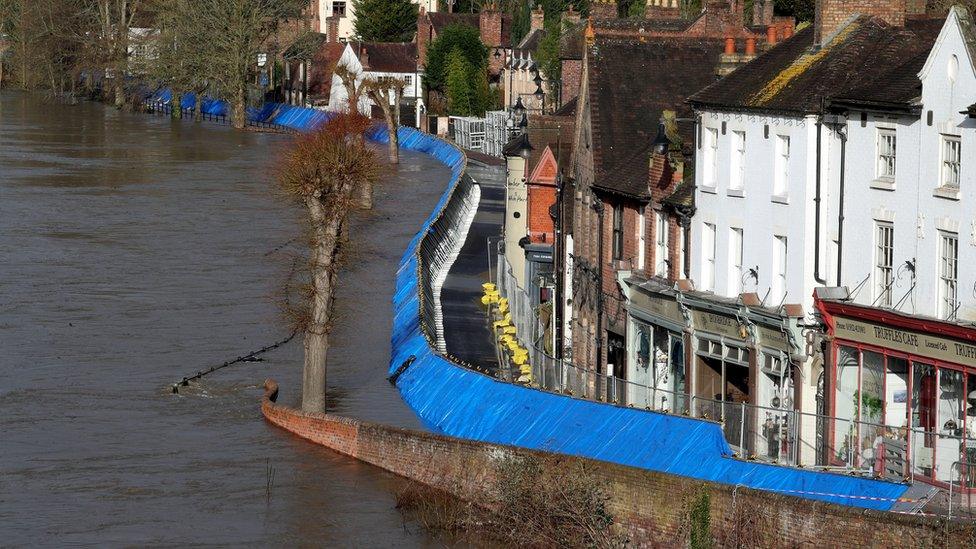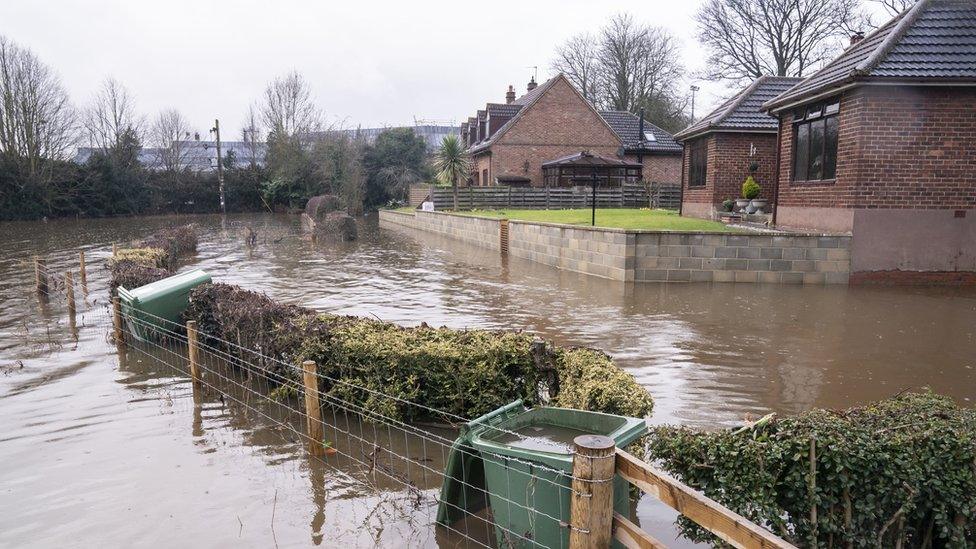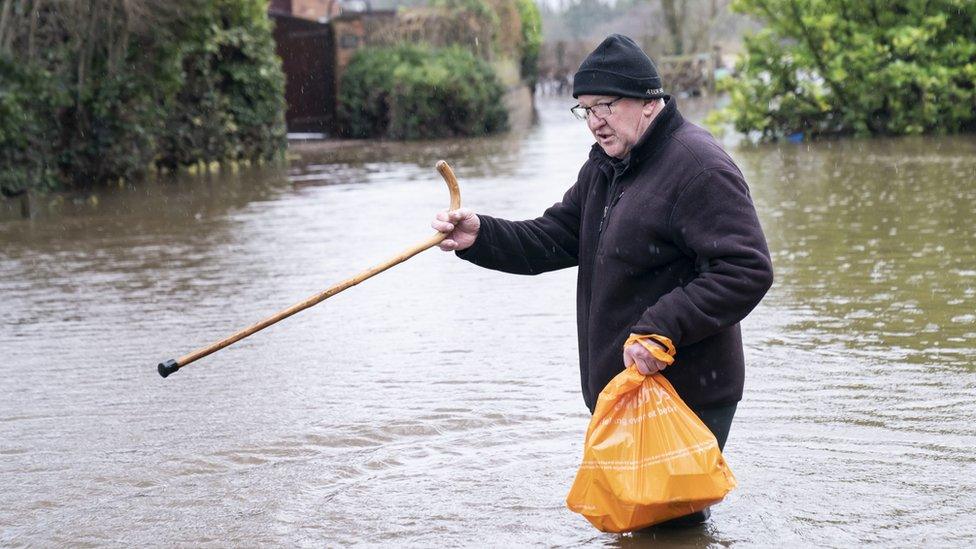Flooding risk persists as UK looks to recover from storm battering
- Published

Flood defences along the River Severn in Ironbridge
Flooding remains a problem around the UK as communities seek to recover recent from storm devastation.
Three people have died, flooding has forced evacuations and millions were left without power over the past week by storms Dudley, Eunice and Franklin.
Nearly 90 flood warnings are in place in England, although more than 30 have been lifted over the course of Tuesday.
However, two "severe warnings" for the River Severn - meaning there is a danger to life - remain in place.
Some homes and businesses have already been evacuated along that river.
The Environment Agency has warned that parts of the West Midlands and northern England should be prepared for significant flooding until Wednesday.
The Met Office said that although there would not be a huge amount of rain on Tuesday, rainfall in areas already affected by flooding could significantly slow down recovery work.
A flood warning remains in place near Wyesham in Monmouthshire, Wales, while in Scotland four flood warnings are in effect -one in Churchill Barriers in Orkney and three in the Tayside area.
In Shropshire, people have been rescued and properties evacuated due to flooding and at Ironbridge two severe flood warnings have been issued - meaning lives are in danger and the Severn barriers are expected to be breached.
The Wharfage Road in Ironbridge - which runs alongside the river - has closed to pedestrians, as it is no longer safe behind the barriers erected there, the Environment Agency said.
Telford & Wrekin councillor Shaun Davies told the PA news agency that the government had provided the town with temporary flood barriers but "there is significant concern they will be breached".
A major incident has also been declared in Bewdley, Worcestershire, alongside one in Ironbridge.
Fourteen people and four dogs have been rescued from flooding in the Melverley area, close to the banks of the River Vyrnwy, Shropshire Council confirmed.
In the Shrewsbury area of the county, the River Severn appears to have peaked at 16.9ft (5.15m), 3.9 inches (10cm) - short of the record levels set in 2000 - and parts of the town centre have been under water.
The rail network in the area has seen trains in Wales and the West Midlands cancelled on Tuesday due to the floods.
National Rail said water levels at Shrewsbury had subsided and lines have reopened, but it warned customers major disruption is set to continue until the evening.
Storm Franklin was the third named storm in a week - following Dudley and Eunice - the first time this has happened since the storm-naming system was introduced in 2015.
The storms left 1.4 million households without electricity, some for up to 72 hours, with wind speeds of over 100mph recorded during Eunice, in which three people died.
Just a few days later, the heavy rainfall brought by Franklin saw widespread flooding across the UK.
Homes, roads and rail hit by storm floods in Wales
In Wales, some roads in Powys are still submerged so the extent of water damage in the local area remains unknown.
County councillor Karl Lewis said Llandinam in Powys had been left looking like a "disaster zone".
A clean-up has begun in Matlock in Derbyshire, after the town's high street was submerged - the third time it has been hit by floods in three years.
It has since emerged a family with a baby in Nottinghamshire had to be rescued from their Land Rover on Saturday, after the four-wheel drive vehicle became stuck in flood water
An elderly couple in Leicestershire narrowly escaped injury when a large tree crashed through their thatched roof during Franklin on Monday.

Flood water in Tadcaster, North Yorkshire after the River Wharfe overtopped its banks

A resident of Tadcaster wading through floodwaters
Meanwhile, latest figures from the Energy Networks Association show about 11,400 customers are still without power as of Tuesday, including in southern England, in the South West and in the East.
UK Power Networks said on Tuesday that 99% of properties across the East and South East had had their power restored.
In Northern Ireland the majority of the 10,000 properties left without power by Storm Franklin have now been reconnected.
Transport networks have also been severely disrupted by the storms over the course of the last week, with trains, airports, ferries, roads and bridges closed due to wind and flooding.
National Rail said people should check before travelling on the railways on Tuesday ahead of a "small number of delays and alterations".
Most train services returned to normal on Tuesday, although some routes are still subject to disruption.
Rotherham Central station in Yorkshire is still closed due to flooding, with services between Doncaster and Sheffield diverting around it.
Network Rail recorded about 200 storm-related incidents between London Paddington and Penzance in Cornwall in recent days, adding that the number of incidents was unprecedented and some of the worst the UK has experienced in three decades
In the past week rail workers faced extreme conditions to restore services - clearing trees, sheds, trampolines and various other obstructions from tracks, as well as fixing overhead electric wires.